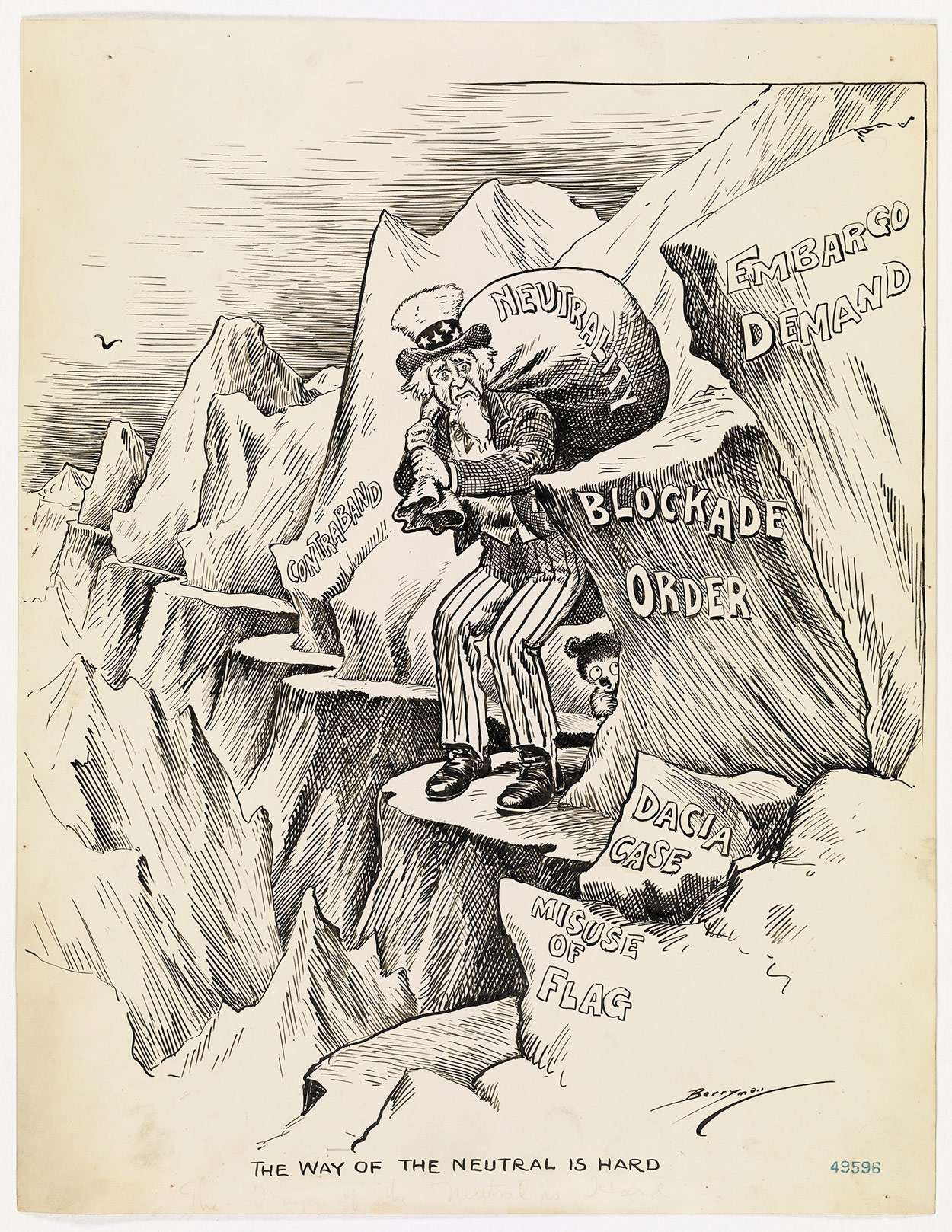The Way of the Neutral is Hard
2/13/1915
Add to Favorites:
Add all page(s) of this document to activity:

The rights of neutral countries to navigate the Atlantic were at the forefront of public attention in early 1915 when Germany instituted the world’s first submarine blockade. In this cartoon, the cliff Uncle Sam inches along displays phrases showing the danger of conducting neutral trade in seas patrolled by submarines.
On February 1, news of a German submarine blockade of Great Britain dominated the headlines. On February 10, the United States separately warned Great Britain and Germany not to interfere with U.S. shipping. A day later, Great Britain declared a blockade of German ports.
The blockades raised alarms about the safety of ships flying the flags of neutral nations. They also raised the issue of ships from nations at war flying the flags of neutral nations to avoid capture. The British liner Lusitania, for example, had sparked international controversy during an earlier February crossing by flying the U.S. flag to avoid attack while off the coast of Ireland. The Lusitania conspicuously flew the British flag when it sailed from New York on the day this cartoon was published.
This cartoon was drawn by Clifford Berryman, one of Washington, DC's best-known cartoonists in the early to mid-1900s. Berryman drew for the Washington Post and Evening Star newspapers. His cartoons touched on a variety of subjects including politics, elections, and both World Wars.
This cartoon is featured in America and the World: Foreign Affairs in Political Cartoons, 1898–1940, a free PDF book from the Center for Legislative Archives at the National Archives.
On February 1, news of a German submarine blockade of Great Britain dominated the headlines. On February 10, the United States separately warned Great Britain and Germany not to interfere with U.S. shipping. A day later, Great Britain declared a blockade of German ports.
The blockades raised alarms about the safety of ships flying the flags of neutral nations. They also raised the issue of ships from nations at war flying the flags of neutral nations to avoid capture. The British liner Lusitania, for example, had sparked international controversy during an earlier February crossing by flying the U.S. flag to avoid attack while off the coast of Ireland. The Lusitania conspicuously flew the British flag when it sailed from New York on the day this cartoon was published.
This cartoon was drawn by Clifford Berryman, one of Washington, DC's best-known cartoonists in the early to mid-1900s. Berryman drew for the Washington Post and Evening Star newspapers. His cartoons touched on a variety of subjects including politics, elections, and both World Wars.
This cartoon is featured in America and the World: Foreign Affairs in Political Cartoons, 1898–1940, a free PDF book from the Center for Legislative Archives at the National Archives.
This primary source comes from the Records of the U.S. Senate .
National Archives Identifier: 6011098
Full Citation: Cartoon D-008; The Way of the Neutral is Hard; 2/13/1915; Berryman Political Cartoon Collection, 1896-1949; Records of the U.S. Senate , Record Group 46 ; National Archives Building, Washington DC, 20408. [Online Version, https://www.docsteach.org/documents/document/way-neutral-hard, April 20, 2024]Rights: Public Domain, Free of Known Copyright Restrictions. Learn more on our privacy and legal page.



